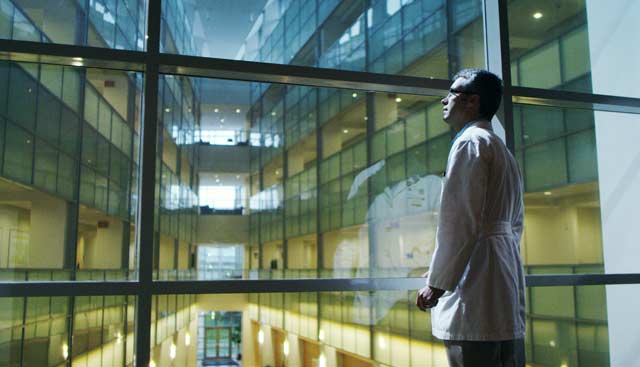Sarcoma Causes and Risk Factors

Sarcoma is a broad category of cancers that originate in bones, muscles, tendons, cartilage and other connective tissues. There are two main types: tumors that arise in bones, such as osteosarcoma and Ewing’s sarcoma, and tumors that arise in muscles, fat, nerves and other soft tissues, such as leiomyosarcoma and liposarcoma.
Compared to other cancers, sarcoma is relatively rare, comprising approximately 1% of adult cancers and 15% of childhood cancers.
Sarcoma causes
Through extensive research, scientists have confirmed that many cancers, including sarcoma, develop as a result of DNA mutations that are either passed down from parent to child or acquired sometime during life. These DNA mutations can lead to cancer by interfering with the function of:
- Oncogenes, which promote orderly cellular division
- Tumor suppressor genes, which cause cells to die at the end of their normal life cycle
If the genes that regulate cell division and death do not function properly, excess cells can build up, bind together, form tumors and potentially spread to nearby lymph nodes and other tissues.
Do sarcoma causes vary by subtype?
Sarcoma has more than 70 distinct subtypes, the causes of which can vary. For instance, through a recent study, researchers found that a mutation in the MYOD1 gene might cause immature muscle cells to divide uncontrollably rather than mature into healthy muscle cells. However, the mutation was found in tissue samples from only one subtype of sarcoma: embryonal rhabdomyosarcoma.
Is sarcoma hereditary?
Scientists have identified several inherited cancer predisposition syndromes that may increase the likelihood of sarcoma. These genetic disorders, which can be passed down from parent to child, include:
- Li-Fraumeni syndrome
- Neurofibromatosis type 1
- Retinoblastoma
- Hereditary leiomyomatosis and renal cell cancer
- Gardner syndrome
- Werner syndrome
- Multiple osteochondromas
While these genetic cancer predisposition syndromes can increase the likelihood of developing sarcoma, it is important to note that most cases occur sporadically with no clear hereditary component. Genetic counseling and testing can help identify individuals at heightened risk for sarcoma due to hereditary factors, enabling proactive surveillance and early intervention strategies.
On the other hand, researchers have determined that the genetic changes that lead to certain types of sarcoma, such as Ewing’s sarcoma, are not hereditary.
Contact us today to schedule an appointment. Call us at 1-888-663-3488 or request an appointment online.
Are there other risk factors for sarcoma?
Certain attributes, characteristics, exposures and behaviors are known to increase the likelihood of developing sarcoma. Through extensive studies, researchers have linked several factors to a heightened risk of sarcoma, including age, gender, certain medical conditions and certain environmental exposures.
Sarcoma risk factors that cannot be controlled
In addition to genetic cancer predisposition syndromes, certain other sarcoma risk factors cannot be controlled, including:
- Age – Some types of sarcoma, such as osteosarcoma and Ewing’s sarcoma, often occur in children and young adults during periods of rapid growth and development.
- Gender – Leiomyosarcoma is more common in females, while rhabdomyosarcoma has a higher incidence in males.
- Chronic lymphedema – Long-term swelling in the arms or legs has been linked to angiosarcoma, a rare and aggressive type of cancer that originates in blood vessels (endothelial cells) or lymphatic vessels.
- Prior radiation exposure – Ionizing radiation from cancer treatment or environmental sources is a known risk factor for sarcoma.
Sarcoma risk factors that can be controlled
While some sarcoma risk factors cannot be controlled, others can be proactively managed. Some controllable risk factors for sarcoma include:
- Chemical exposure – Minimizing exposure to certain industrial chemicals and toxins, such as vinyl chloride and arsenic, can help reduce the risk of sarcoma.
- Radiation exposure – While prior radiation therapy for cancer treatment is a nonmodifiable risk factor, it may be possible to minimize exposure to other sources of ionizing radiation.
In occupational settings in high-risk industries such as mining and defense, it is essential to follow all recommended safety guidelines and use appropriate protective equipment. Although these measures can help reduce the risk of sarcoma, they cannot completely prevent it. Those who are concerned about their risk factors or family history are encouraged to consult with a healthcare professional for personalized advice and guidance.
Benefit from world-class care at Moffitt Cancer Center
Moffitt is the only National Cancer Institute-designated Comprehensive Cancer Center based in Florida. As such, we receive extensive support to perform cancer studies, through which our outstanding research team continues to learn more about sarcoma causes and risk factors every day. We take a unique bench-to-bedside approach to ensure that our patients can benefit from our research breakthroughs as quickly as possible. As soon as we discover a potential risk factor, new diagnostic technique or promising treatment option, we implement our newfound knowledge to expand our services and offerings, which include a robust portfolio of clinical trials.
If you would like to learn more about sarcoma causes and risk factors, you can request an appointment with a specialist in our Sarcoma Program by calling 1-888-663-3488 or submitting a new patient registration form online. We do not require referrals.
References
American Cancer Society – What Causes Soft Tissue Sarcomas?
Ewing Sarcoma - Childhood and Adolescence: Risk Factors
American Society of Clinical Oncology – Sarcomas, Soft Tissue: Risk Factors
National Institutes of Health – Sarcomas Associated With Genetic Cancer Predisposition Syndromes: A Review
Diagnosis & Treatment
